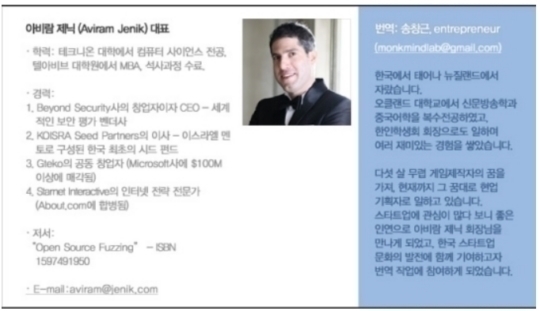오늘날 수많은 스타트업들이 성공으로 가기위한 비법을 찾아 다니곤 합니다. 그리고 이 중 가장 흔하면서도 만족스러운 방법으로 알려진 것이 있다면, 바로 멘토를 만나는 일이죠. 일단 만나기만 해도 단기적으로는 무언가를 해냈다는 성취감을 주면서도, 좋은 멘토라면 숨겨진 보물에 대한 단서라도 찾은 듯한 기분을 느끼게 해주기 때문입니다. 단 30분의 대화만으로도 회사가 성공하기 위한 방법을 찾을 수 있는 듯 보이죠. 5번 정도의 만남을 거쳐보고 나면 이 확률이 기하급수적으로 늘어나는 듯 보이기도 하고요. 그렇다면 10번, 50번의 만남을 더 가져보는건 어떨까요?
아닙니다. 틀렸습니다. 일단 성공에 대한 비법 같은 것은 세상 어디에도 존재하지 않기에, 멘토와의 짧은 만남이 당신에게 어떤 영감을 줄 수는 없는 노릇입니다. 처음 멘토를 만나면서 얻은 성취감은 며칠이 지나면서 점점 감소할 것이구요. 가장 최악의 경우로는 이후 다른 멘토를 찾아 만나게 될 때까지 계속해서 그 가짜 보물을 쫓아 다니게 될지도 모른다는 점입니다. 이처럼 멘토와의 만남은 0 칼로리의 식사를 하는 것에 비유할 수 있습니다. 식사 후엔 배도 부르고 만족스럽게 느껴지지만, 곧 배는 다시 고파질 것이고 이 와중에 식사가 건강에 끼친 긍정적인 영향은 하나도 없는 상태인거죠.
허나 그렇다고해서 멘토를 두는 것이 전혀 도움되지 않는 일이라는 말은 아닙니다. 오히려 그 반대죠. 어떤 분야에서 성공한 이에게 질문한다면, 그는 반드시 멘토와 있었던 경험을 잘 활용하여 성공하였다는 대답을 해줄 것입니다. 멘토를 잘 활용하는 법을 배워야만 합니다. 한국의 경우에는, 종종 멘토를 선생님과 비슷한 개념으로 바라보는 경향이 존재하는데요, 마치 신라의 역사를 가르쳐준다거나, 수학 공식을 대신해서 풀어줄 것 같은 식으로 말이죠.
허나 사실 좋은 멘토라는 것은 많은 팩트로 무장한 선생님이 아니랍니다. 이미 앞서 적었 듯, 그 누구도 성공으로 가는 비법을 알지는 못하기 때문이죠. 멘토는 조언자로서 더 많이 활용되어야만 합니다. 가령 아주 세세한 문제에 대한 해결책을 찾을 때 처럼 말이죠. 이들이라면 가진 경험을 통해 문제 해결에 대한 지름길을 제시해줄 수 있습니다. 당신 혼자서는 훨씬 더 오래 걸릴만한 일들을 더 빨리 해낼 수 있는 능력이 있기 때문이죠. 허나 그렇다고 해서 이들이 당신에게 성공으로 가는 확실한 방법을 제시해줄 수 있는 것은 아닙니다.
그렇다면 멘토로부터 실제로 도움을 받고 있다는 것은 어떻게 알 수 있을까요? 이를 위해 우선 당신이 가진 기대에 대해 정의해보는 일이 필요합니다. 만남을 통해 어떤 이득을 얻길 기대하나요? 실제로 스타트업을 운영하면서 결정하는 모든 행동에는 기대되는 결과에 대한 측정이 필수죠. ROI(투자대비이익)이라고도 하구요 멘토와 만나는 것 또한 이와 다르지 않습니다. 미팅 후 얻게 될 결과에 대해 확실히 정의가 되었다 생각된다면, 행여나 그게 `영감을 얻는다`, `나아갈 옳은 방향에 대해 이해한다` 또는 `영향력 있는 자에게 내 사업에 대해 알린다`와 같은 건지 살펴보세요. 이런 목표들은 미팅에서 가질만한 좋은 목표는 아니며, 어찌됐든 그 결과 값을 측정하기도 어렵다는 특징이 있습니다.
그러나 만약 목표가 어떤 특정인들에게 회사를 알리는 것, 또는 현재 마주친 특정 문제에 대한 답을 찾는 종류의 일이라면, 미팅을 가지는 동안 조금 더 확실히 문제를 정의할 수 있도록 해보세요. 애매모호하지 않은 설명을 통해 당신이 원하는 것을 설명해주고, 답변을 기대해보는 겁니다. 가끔은 그 답이 부정적일 때도 있습니다. 만약 그렇다면, 반드시 왜 부정적인지 확인해보셔야하구요. 어떨 때는 질문에 대해 멘토가 대답을 해주지 못하는 상황도 있을겁다. 허나 이 또한 문제는 아닙니다. 최소한 당신은 (그 문제를 해결하려 미래에 쏟게될지도 몰랐던) 시간을 절약한 셈이니깐요.
또 어떨 때는 멘토가 당신을 돕지 않으려 할 때도 있을 겁니다 (그리고 이 경우엔 아주 부드럽고도 간접적인 식으로 대답하여 당신의 기분이 상하지 않게끔 하려하죠). 그렇다면 그 때는 왜 그런 일이 일어났는 지를 생각해보시는겁니다. 멘토가 정말로 그의 시간과 에너지(그리고 이미 가진 명성)을 당신 회사에 쏟을만큼의 가치가 있었는지, 아니면 질문 자체에 대한 설득이 부족하진 않았는지를 돌이켜보는 겁니다.
마지막으로, 어떤 멘토들은 당신의 요청에 대해 기꺼이 도움을 주려할 것이나, 질문 자체가 잘못되었다고 생각할 수 있습니다. 저 또한 가끔은 준비도 되지 않은 스타트업들로부터 투자자나 파트너를 소개시켜달라는 요청을 받을 때가 있는데요, 이 때야말로 멘토의 조언을 듣는 것이 중요한 때 랍니다. 과연 그 멘토가 제대로 정답을 준 것인지(만약 그렇다면 서둘러 당신이 향하고 있던 잘못된 방향을 바꾸어야 겠죠), 아니면 그 조언에 동의하지 않기에 현재의 방향을 유지할 것인지 말입니다.
후자의 경우라면 멘토가 당신에 대해 잘못 짚었다는 것을 확인시켜줄 수 있는 기회가 온 셈입니다. 그리고 만약 제가 그 상황에서의 멘토라면, 제가 제시해준 방법에 대해 틀렸다 말하는 스타트업을 보았을 때, 이는 제가 그 스타트업 창업자에 대한 열렬한 서포터가 되어주게끔 만들어주지요. 멘토로서 제가 잘못되었다는 것을 증명만 하게 되면, 그 때부턴 제가 옆에서 당신을 최대한 열심히 도와줄 수 있는 멘토가 되어줄 수 있을 것입니다.
===
What makes startups successful?
What is it that makes startups successful? The secret formula or the one thing that turns failure into success?
Let me save you the suspense: I don`t know the answer. It doesn`t seem like anyone else has the answer, either. It`s very probable the answer doesn`t exist. Maybe you should stop wasting your time looking for this buried treasure: no one can give you the treasure map.
Too many startups are looking for the secret that will make their startup successful. One very common (and also seems to be very satisfying) way for a startup is to meet with mentors; there is a short-term feeling of achievement when you do it, and a good mentor always makes you feel as though you found a clue to that hidden treasure: a 30 minute discussion with a mentor will uncover how to make your startup successful. 5 good meetings with mentors will multiply your chances exponentially, right? How about 10? 50?
Wrong. Since the secret doesn`t exist, a short meeting won`t reveal it to you; at best, the feeling of achievement will gradually decrease over the next few days. At worst, you will be chasing this false treasure until you meet the next mentor, which will take you in a different direction, yet again trying to find a secret that doesn`t exist. Mentor meetings are too often like eating empty calories. You feel full and happy for a while, but then get hungry again, while not contributing much to your body`s health.
That`s not to say mentors are never helpful: the reverse it true. Every successful person will tell you about their experience with mentors who helped this success. But you need to know how to use mentors; especially in Korea, there`s a tendency to use mentors as teachers: as if they can tell you how to solve mathematic equations or teach you about shila-dynasty history.
But the fact is, good business mentors are not teachers equipped with facts: we already established nobody knows the secret road to success. Mentors should be used more like advisors, used to solve very specific problems; mentors can help you find shortcuts based on their experience; mentors can do work that would have taken you much longer to accomplish on your own. But mentors cannot point the guaranteed way for success.
How to know that you`re getting a benefit from a mentor? The first thing is to define your expectations; what are you hoping to gain by meeting with them? Every action you take while you`re running your startup should be measured in terms of expected results, or ROI - a meeting with a mentor is not different. Now that you have clearly defined your expected results from the meeting, see if you wrote something like "receive motivation", "understand the right direction" or "spread the word about my startup to influential people". These are not good goals for a meeting with a mentor and are so unclear they can`t be measured anyway.
However, if your goals are to be introduced to certain people or get answers to specific problems you are facing, make sure you clearly define it during the meeting with the mentor. Ask for what you want in an unambiguous way and see what the response is: sometimes the answer will be negative; you need to understand why that is. Perhaps the mentor cannot help you with what you`re asking: that`s ok, at least you saved your time (and the mentor`s).
Other times the mentor does not want to help you (this will often be conveyed in a soft and indirect way as to not hurt your feeling): try to think why that is; are you giving the mentor a good enough reason to spend their time and energy (and reputation) on your startup? Perhaps you haven`t done a good job convincing them?
Finally, some mentors will be willing to help you, but will think that you are asking for the wrong thing. I often have startups asking me to introduce investors and partners to them at a stage when they are clearly not ready for it. This is where listening to the mentor is vital: you need to decide if the mentor is making a good case (which may mean you need to change direction ASAP) or if you disagree with the mentor and decide to stay the course; thank the mentor and move on: you now have a chance to prove the mentor was wrong about you - if I am that mentor, showing me that I was wrong about my prediction for a startup will make me an avid supporter of this startup founder. Prove me wrong and you`ll see me fighting in your corner as hard as I can.
===
- Aviram

관련뉴스














